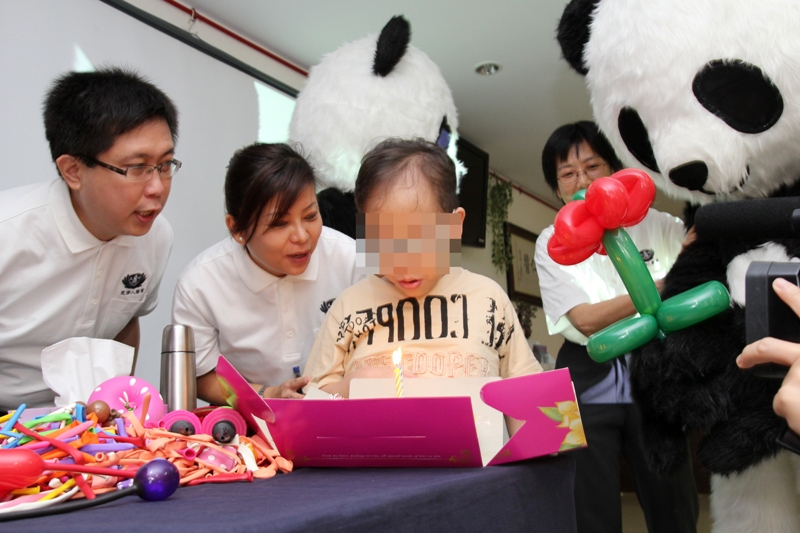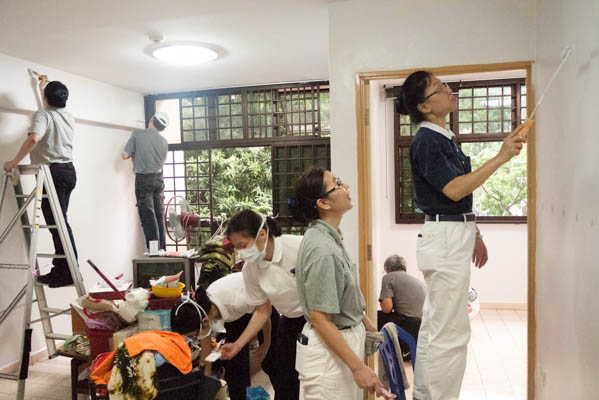Nurse Nancy Tan (left) and Tzu Chi home care team members visit Salih’s (centre) home to clean his wound. (Photo by Bernard Ng)
Even before the Tzu Chi medical team had arrived, Salih was already at his door waiting. If not for the obvious difference in race, the scene would have been mistaken for one in which family members were meeting.
“Pak Cik, apa khabar (Uncle, how are you)?” Nurse Nancy Tan spoke to him in a mixture of English and Malay. Salih is an Indonesian Muslim who lives alone in a typical HDB flat, and from his neatly combed hair right down to his getup of short-sleeved shirt and sarong, he appears no different from the other elderly seniors one sees.
Yet just a year ago, his neighbours would take pains to avoid seeing him. Salih had been suffering from elephantiasis for the last 20 years and his unwillingness to seek medical attention had left his leg festering with pus, the stench from which his neighbours had to endure.
“He was only afraid of being brought to hospital and having his leg amputated,” explained Tan.
Welcoming a God-Daughter Home
In 2009, the Alexandra Hospital referred dialysis patient Peah, to the Tzu Chi Free Clinic at Redhill. After evaluation, the Tzu Chi Foundation (Singapore) provided long-term dialysis treatment for her which lasted till February 2014.
Soon after Tzu Chi first accepted Peah as a beneficiary, she brought along her husband Salih to the Free Clinic to seek treatment. A patient file was opened for Salih in August and a nurse would make house calls to help clean his sores. As he refused to visit the hospital and would not hear of surgery, the medical team taught him how to clean the affected skin and they continued to visit him till the year’s end.
After Peah passed away, the Free Clinic lost contact with Salih. In March 2015, the Social Service Office (SSO) received feedback from his neighbours and Salih’s case was referred to the Tzu Chi medical home care team. At this point, Salih’s condition was deteriorating steadily and he had no one to look after him as both his son and grandson rarely came by.
The SSO learnt of his situation and contacted his god-daughter Titi, who had been his neighbour when she was a child. Peah had cared for Titi then, but after the child moved away with her family, they gradually drifted apart.
Titi visited Salih upon receiving the call and subsequently came to an important decision after struggling with her feelings. She said that she had decided to move in with Salih as she was the only one he would listen to; if she did not help, he would have no one else to turn to. “We ourselves do not wish to see the day that we end up in a similar situation when we grow old,” Titi sighed as she explained her sacrifice.
Titi became Salih’s confidante and began taking care of his living needs, but she was helpless when it came to the messy house and his reluctance to clean his sores. It was then that the Tzu Chi team stepped in.
Letting the Sun’s Rays In
“Salih was initially very afraid of the medical team; even when we (just) wanted to help clean his leg, he would say that he would rather commit suicide,” said Lim Kim Yan, the nurse in charge of the medical home care team. She said that he might have realised that Tzu Chi volunteers only had kind intentions at heart when a group of them helped clean up his house in May last year. So three months later, he finally allowed the home care team members to touch his leg.
The home care team adopted the approach of first visiting him to show their concern and giving him milk supplies during the period that he refused to cooperate. Then, on 17 May 2015, a 32-man team of Tzu Chi volunteers showed up to help spruce up his home. On the same day, the team also furnished Salih with a new electronic adjustable bed, a new shirt, and a sarong.
“I think that if his home had continued being in the same (unkempt) state, it would not have been an ideal living environment for anyone. If we had only cleaned up his leg and not his home too, it would have been akin to doing only half the job.” Because they could not bear for Salih to continue this way, the team persisted in talking to him and eventually got the green light to spruce up his home.
Today, the two-bedroom flat sports an entirely new look with more than 20 pots of cactuses adorning the doorway, while the area where clothes are hung out to dry gives off similar green vibes. Simple decorative items and personal use products are placed on the wooden shelf near his bed. It is hard to imagine with the clean and tidy environment now, how it took 10 hours and two lorry-loads of discards for the team to transform Salih’s flat. Lim was moved to comment that seeing the neatness all around evoked deep feelings of happiness in her.
Building Trust and Giving Holistic Care
Though Salih is now agreeable to having his sore cleaned, the process was far from easy. The medical team would find him willing one day and unwilling the next; Titi had to be around if they were to have the job done.
Knowing that what he actually needed was love and care, they would tell him again and again, “ We’re here to help you.” Whenever they came to clean his wound, they would patiently listen to him and reply with smiles, even if it was something that they had heard many times before.
Two months passed by, and in consideration of Titi’s work schedule where she sometimes had to work night shifts, and because she would take care to remind him repeatedly that they were coming, the team decided to try interacting with Salih alone. They were successful in the attempt and subsequently, even got someone to repair his faulty kitchen tap so that he need not enter the toilet each time he wanted to wash something.
The following year in January 2016, Titi attended the Tzu Chi Year-End Blessing Ceremony and testified to the long-term care that Salih had received. She told the audience that the lengths the team went to in order to help Salih was obvious to her. With Tzu Chi’s help, Salih’s situation had improved and she was able to move back to her own home. She still visits sometimes, helping to tidy up his home.
The Healing of a Sore
Cleaning a sore entails many steps and from cleaning to dressing, it takes a total of two hours. When the sore is big, the dead skin at the site must be washed off first with salt water.
“We would stay longer so that he could have time to talk to us,” said Nancy Tan with a smile. She would first make small talk with Salih by asking if Titi was home, and he would share what he had done in the day with her. If Titi was home, Tan would tell her to grab a few winks to relieve her tiredness.
Noticing that his sore was healing and getting smaller, Salih was happy. The time taken to treat his sore was halved and the stench was virtually gone. He would tell Tan that his leg was nearly healed and he may only need one or two more cleaning sessions.
The team took advantage of the speedy healing process to inculcate the right care methods to Salih. They taught him the proper way to dress his sore as they had noticed that he would use newspapers to wrap his leg in the past. When new medication was applied to his skin, Tan would remind him not to remove the dressing at will.
“(The effort) is worth it; patients treat you as family and share their problems with you. More importantly, they have deep trust in you,” said Tan who had joined the medical home care team for less than a year. She believes that when a patient is happy, the time taken to recover will be faster.
Salih likes to tell them that God has sent them to take care of his sore and prays for health and happiness of the team and their families. Tan always cheerily replies that it must be fate that brought them together. With the blessing of such bonds of affinity, the medical team endeavours to see the day of Salih’s complete recovery.
After the clean up of Salih’s house 10 months ago, the flat still maintains its tidy look. (Photo by Bernard Ng)
Tan teaches Salih how to express his feelings of gratitude in Mandarin. (Photo by Bernard Ng)
In January 2016, Titi (centre) shares Salih’s story during the Tzu Chi Year-End Blessing Ceremony. (Photo by Chua Teong Seng)
Knowing that Salih just wanted others to care for him, home care team members would take time to chat with him when they visited to dress his wound. (Photo by Zhou Li Mei)
When the medical home care team first started cleaning Salih’s sore, they needed two hours due to the size of the wound. (Photo by Lim Kim Yan)
In May 2015, Tzu Chi volunteers and home care team members spent ten hours clearing two truckloads of unwanted items from Salih’s home. (Photo by Pua Poo Toong)
Before receiving medical attention from Tzu Chi, Salih’s leg oozed pus and he would use newspapers to wrap his sore. (Photo by Lim Kim Yan)



